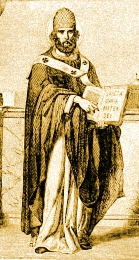Lives of the Saints
Our Models and Protectors
Spiritual Bouquet:
May 19

Saint Peter Celestine
Pope
(1221-1296)
Saint Peter Celestine was the eleventh of the twelve children of a poor Italian farmer. As a child, Peter had visions of our Blessed Lady, Angels and Saints. His heavenly visitors encouraged him in his prayers and chided him when he fell into any fault. His mother, though only a poor widow, sent him to school, feeling sure that he would one day be a Saint.
At the age of twenty, he left his home in Apulia to live in a mountain solitude. Here he passed three years, assaulted by the evil spirits and beset with temptations of the flesh, but consoled by the visits of Angels. After this his seclusion was invaded by disciples who refused to be sent away; and the rule of life which he gave them formed the foundation of the Celestines, a branch of the Order of Saint Benedict. Angels assisted in the church which Peter built; unseen bells rang peals of surpassing sweetness, and heavenly music filled the sanctuary when he offered the Holy Sacrifice; he had consented to be ordained, to find in the Holy Eucharist assistance against temptation.
Suddenly the poor anchorite found himself torn from his loved solitude, having been named by acclamation to the Papal throne, which had remained vacant for twenty-seven months. Resistance was of no avail. He took the name of Celestine, to remind him of the heaven he was leaving and for which he sighed. He was seventy-two years old. After a reign of five months, Peter judged himself unfit for the office, and summoning the cardinals to his presence, he solemnly resigned his trust.
During the remaining three years of his life he worked many and great miracles. On the day after his abdication, his blessing after Mass healed a lame man. Saint Peter left the palace, desiring seclusion, but was brought back by the papal guards, for his successor feared a schism; crowds had followed Saint Peter. Lest he be prevailed upon to take back his office, he was put under surveillance at Anagni. Content, he remarked: I desired nothing but a cell, and a cell they have given me. And there he enjoyed his former loving intimacy with the Saints and Angels, and sang the Divine praises almost continually.
At length, on Pentecost Sunday he told his guards he would die within the week, and immediately fell ill. He received the Last Sacraments, and the following Saturday, as he finished the concluding verse of Lauds, Let every spirit bless the Lord! he closed his eyes to this world and opened them to the vision of God.
Reflection. To the one who withdraws himself from acquaintances and friends, says the Imitation of Christ, God will draw near with His holy Angels.
Les Petits Bollandistes: Vies des Saints, by Msgr. Paul Guérin (Bloud et Barral: Paris, 1882), Vol. 6; Little Pictorial Lives of the Saints, a compilation based on Butler's Lives of the Saints and other sources by John Gilmary Shea (Benziger Brothers: New York, 1894); Vie des Saints pour tous les jours de l'année, by Abbé L. Jaud (Mame: Tours, 1950).